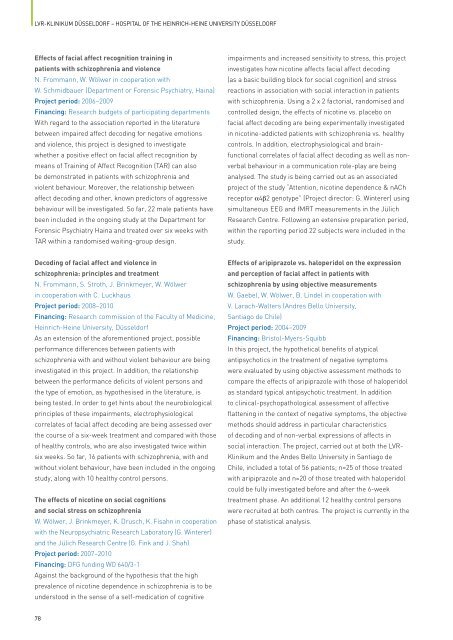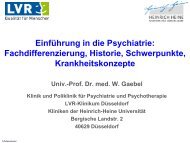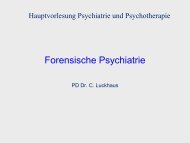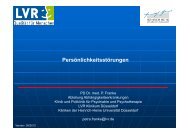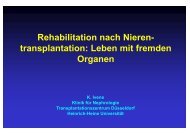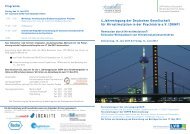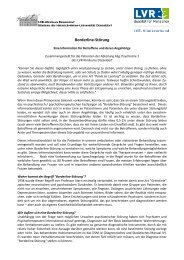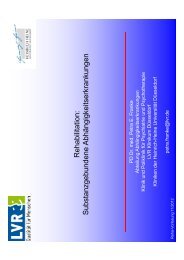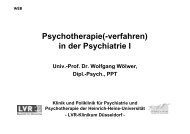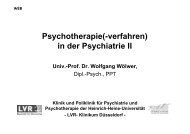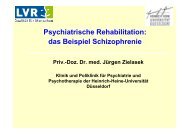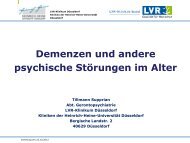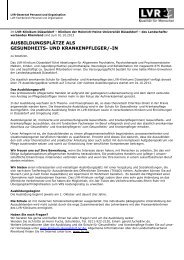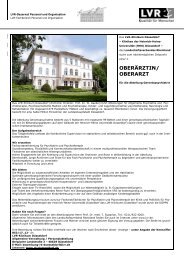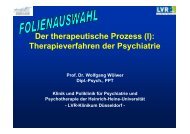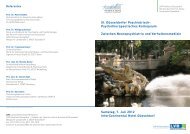LVR-Klinikum Düsseldorf Hospital of the Heinrich-Heine University ...
LVR-Klinikum Düsseldorf Hospital of the Heinrich-Heine University ...
LVR-Klinikum Düsseldorf Hospital of the Heinrich-Heine University ...
You also want an ePaper? Increase the reach of your titles
YUMPU automatically turns print PDFs into web optimized ePapers that Google loves.
<strong>LVR</strong>-KLINIKUM DÜsseLDORF – hOsPITaL OF The heINRIch-heINe UNIVeRsITY DÜsseLDORF<br />
Effects <strong>of</strong> facial affect recognition training in<br />
patients with schizophrenia and violence<br />
N. Frommann, W. Wölwer in cooperation with<br />
W. Schmidbauer (Department or Forensic Psychiatry, Haina)<br />
Project period: 2006–2009<br />
Financing: Research budgets <strong>of</strong> participating departments<br />
With regard to <strong>the</strong> association reported in <strong>the</strong> literature<br />
between impaired affect decoding for negative emotions<br />
and violence, this project is designed to investigate<br />
whe<strong>the</strong>r a positive effect on facial affect recognition by<br />
means <strong>of</strong> Training <strong>of</strong> Affect Recognition (TAR) can also<br />
be demonstrated in patients with schizophrenia and<br />
violent behaviour. Moreover, <strong>the</strong> relationship between<br />
affect decoding and o<strong>the</strong>r, known predictors <strong>of</strong> aggressive<br />
behaviour will be investigated. So far, 22 male patients have<br />
been included in <strong>the</strong> ongoing study at <strong>the</strong> Department for<br />
Forensic Psychiatry Haina and treated over six weeks with<br />
TAR within a randomised waiting-group design.<br />
Decoding <strong>of</strong> facial affect and violence in<br />
schizophrenia: principles and treatment<br />
N. Frommann, S. Stroth, J. Brinkmeyer, W. Wölwer<br />
in cooperation with C. Luckhaus<br />
Project period: 2008–2010<br />
Financing: Research commission <strong>of</strong> <strong>the</strong> Faculty <strong>of</strong> Medicine,<br />
<strong>Heinrich</strong>-<strong>Heine</strong> <strong>University</strong>, <strong>Düsseldorf</strong><br />
As an extension <strong>of</strong> <strong>the</strong> aforementioned project, possible<br />
performance differences between patients with<br />
schizophrenia with and without violent behaviour are being<br />
investigated in this project. In addition, <strong>the</strong> relationship<br />
between <strong>the</strong> performance deficits <strong>of</strong> violent persons and<br />
<strong>the</strong> type <strong>of</strong> emotion, as hypo<strong>the</strong>sised in <strong>the</strong> literature, is<br />
being tested. In order to get hints about <strong>the</strong> neurobiological<br />
principles <strong>of</strong> <strong>the</strong>se impairments, electrophysiological<br />
correlates <strong>of</strong> facial affect decoding are being assessed over<br />
<strong>the</strong> course <strong>of</strong> a six-week treatment and compared with those<br />
<strong>of</strong> healthy controls, who are also investigated twice within<br />
six weeks. So far, 16 patients with schizophrenia, with and<br />
without violent behaviour, have been included in <strong>the</strong> ongoing<br />
study, along with 10 healthy control persons.<br />
The effects <strong>of</strong> nicotine on social cognitions<br />
and social stress on schizophrenia<br />
W. Wölwer, J. Brinkmeyer, K. Drusch, K. Fisahn in cooperation<br />
with <strong>the</strong> Neuropsychiatric Research Laboratory (G. Winterer)<br />
and <strong>the</strong> Jülich Research Centre (G. Fink and J. Shah)<br />
Project period: 2007–2010<br />
Financing: DFG funding WO 640/3-1<br />
Against <strong>the</strong> background <strong>of</strong> <strong>the</strong> hypo<strong>the</strong>sis that <strong>the</strong> high<br />
prevalence <strong>of</strong> nicotine dependence in schizophrenia is to be<br />
understood in <strong>the</strong> sense <strong>of</strong> a self-medication <strong>of</strong> cognitive<br />
78<br />
impairments and increased sensitivity to stress, this project<br />
investigates how nicotine affects facial affect decoding<br />
(as a basic building block for social cognition) and stress<br />
reactions in association with social interaction in patients<br />
with schizophrenia. Using a 2 x 2 factorial, randomised and<br />
controlled design, <strong>the</strong> effects <strong>of</strong> nicotine vs. placebo on<br />
facial affect decoding are being experimentally investigated<br />
in nicotine-addicted patients with schizophrenia vs. healthy<br />
controls. In addition, electrophysiological and brainfunctional<br />
correlates <strong>of</strong> facial affect decoding as well as nonverbal<br />
behaviour in a communication role-play are being<br />
analysed. The study is being carried out as an associated<br />
project <strong>of</strong> <strong>the</strong> study “Attention, nicotine dependence & nACh<br />
receptor α4β2 genotype” (Project director: G. Winterer) using<br />
simultaneous EEG and fMRT measurements in <strong>the</strong> Jülich<br />
Research Centre. Following an extensive preparation period,<br />
within <strong>the</strong> reporting period 22 subjects were included in <strong>the</strong><br />
study.<br />
Effects <strong>of</strong> aripiprazole vs. haloperidol on <strong>the</strong> expression<br />
and perception <strong>of</strong> facial affect in patients with<br />
schizophrenia by using objective measurements<br />
W. Gaebel, W. Wölwer, B. Lindel in cooperation with<br />
V. Larach-Walters (Andres Bello <strong>University</strong>,<br />
Santiago de Chile)<br />
Project period: 2004–2009<br />
Financing: Bristol-Myers-Squibb<br />
In this project, <strong>the</strong> hypo<strong>the</strong>tical benefits <strong>of</strong> atypical<br />
antipsychotics in <strong>the</strong> treatment <strong>of</strong> negative symptoms<br />
were evaluated by using objective assessment methods to<br />
compare <strong>the</strong> effects <strong>of</strong> aripiprazole with those <strong>of</strong> haloperidol<br />
as standard typical antipsychotic treatment. In addition<br />
to clinical-psychopathological assessment <strong>of</strong> affective<br />
flattening in <strong>the</strong> context <strong>of</strong> negative symptoms, <strong>the</strong> objective<br />
methods should address in particular characteristics<br />
<strong>of</strong> decoding and <strong>of</strong> non-verbal expressions <strong>of</strong> affects in<br />
social interaction. The project, carried out at both <strong>the</strong> <strong>LVR</strong>-<br />
<strong>Klinikum</strong> and <strong>the</strong> Andes Bello <strong>University</strong> in Santiago de<br />
Chile, included a total <strong>of</strong> 56 patients; n=25 <strong>of</strong> those treated<br />
with aripiprazole and n=20 <strong>of</strong> those treated with haloperidol<br />
could be fully investigated before and after <strong>the</strong> 6-week<br />
treatment phase. An additional 12 healthy control persons<br />
were recruited at both centres. The project is currently in <strong>the</strong><br />
phase <strong>of</strong> statistical analysis.


